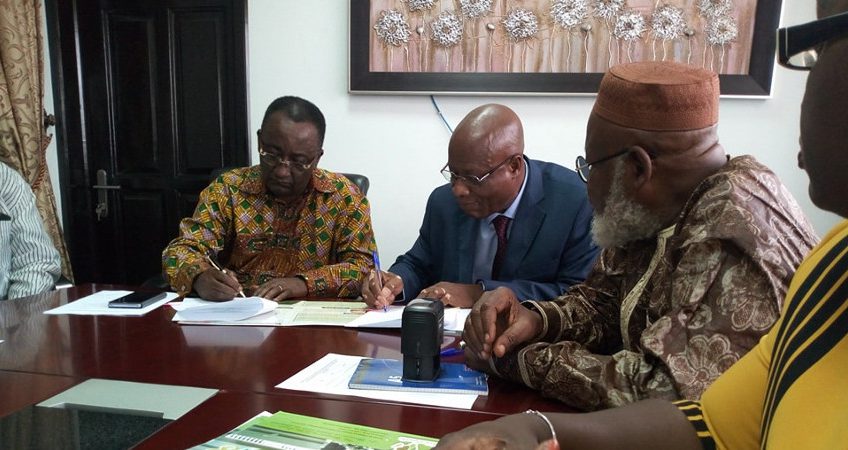On 5 March in Accra, the Ghanaian Ministry of Food and Agriculture signed a Memorandum of Understanding (MoU) with AfricaSeeds, the pan-African seed institution of the African Union (AU). During the ceremony, the Minister of Food and Agriculture, Dr Owusu Afriyie Akoto, signed on behalf of his country, and the Executive Director of AfricaSeeds, Dr Kouame Miezan, signed on behalf of his institution.
The MoU is designed to concretely map out the areas of collaboration between AfricaSeeds and the Ministry of Food and Agriculture in Ghana and establish the modalities of joint actions. It sets the obligations that both parties may each shoulder towards the huge continental struggle to endow Africa and each Member State with an effective seed sector apparatus within the framework of the African Seed and Biotechnology Program (ASBP). The MoU will eventually contribute to the achievement of the Comprehensive African Agriculture Development Programme (CAADP) agenda on agricultural transformation, food and nutrition security and poverty reduction.
AfricaSeeds’ official visit to Ghana from 4 to 9 March and the signing ceremony were the result of previous exchanges between AfricaSeeds and the Ministry on pooling resources to achieve effective synergy between the two parties for the benefit of the Ghanaian seed sector.
A diligent country in agricultural transformation
Ties with Ghana are of special importance to AfricaSeeds. The country is among the most committed and diligent ones in terms of CAADP implementation. Ghana has significantly increased the share of agriculture in total public expenditure over the years. The country is also a champion in seed development and has attained substantial growth in the sector.
In fact, seeds are a central element of Ghana’s 2017-2020 flagship “Planting for Food and Jobs” initiative, a country-wide program aiming at job creation in agriculture. One of the five pillars of the program is seed access and development. “We know fully well that market-led production of adequate quantities of quality seeds paired with timely distribution will result in greater productivity and improved food security” said the Coordinator of the Program, Dr John Manful, who met the AfricaSeeds’ team.
The Minister expressed his commitment to AfricaSeeds. “We are now engaging to collaborate in an effective and fruitful manner”, said the Minister. “I strongly support AfricaSeeds’ role and mission, being convinced that the institution will contribute to the efforts by the Government of Ghana and all stakeholders to develop the seed industry”. A National Focal Point was appointed who will serve as the interface between AfricaSeeds and the national seed program.
Specialized knowledge about seeds is key
However, more needs to be done in order to achieve a vibrant, pluralistic and efficient seed sector. Through the Memorandum, AfricaSeeds will offer specialized seed knowledge and technical guidance to meet the challenge of underutilization of quality seeds by farmers. AfricaSeeds will also connect the country to solutions based on time- and place-tested experiences across Africa, required to confront the challenges faced by the Ghanaian seed sector. Importantly, AfricaSeeds brings to the table the determination to deploy the ASBP as the African-led seed program and framework that should guide the Ministry of Food and Agriculture in policy development and action.
The Executive Director was accompanied by his Principal Advisor Josiah Wobil and the AfricaSeeds’ Gender Officer, Emilienne Guei. “We were impressed by the skills and dedication of the public officials we met during our visit” said Dr Miezan. “It is truly a great opportunity to work with Ghana and the areas of collaboration we identified are likely to produce a ripple effect on the entire seed value chain” he commented.
Capacity building of all stakeholders and the development of joint public/private initiatives are among AfricaSeeds’ priorities for the decade 2016-25. Tackling those will help in addressing the challenges of seed sector development towards agricultural transformation and increased food and nutrition security in Ghana and beyond.
